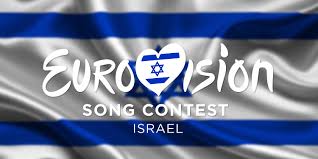PLO Flag at Eurovision? The New Rules of the Competition
Basel is preparing for a celebration — but also for concerns over political statements • A change in flag policy will allow broader freedom of expression among the audience, while imposing new restrictions on the artists themselves.

Unlike in previous years, when spectators were not allowed to wave flags of countries not officially participating in the competition, this year the organizers of Eurovision 2025 in Basel have decided to place freedom of expression at the forefront - whatever the cost.
The result: audiences will be permitted to wave Palestinian flags, along with other flags of countries not included among the competing nations — raising questions about whether this move will open the door to political protests inside the arenas and damage the purity of the competition.
In the past, the official policy of the European Broadcasting Union (EBU) allowed only the flags of participating countries, along with the EBU's own flag and the Pride flag, to be displayed by the audience. The ban on non-competing countries' flags had repeatedly sparked controversy and outrage, especially around the issue of Palestinian flags, but also regarding Catalonia and other regions around the world seeking independence.
Following protests over the enforcement of this policy during Eurovision 2024 in Malmö, the EBU announced it would review its flag policy — and its new decision has been finalized ahead of this year's contest in Basel. Now, as stated, audiences will be allowed to bring in any flag that does not violate Swiss law, incite violence, display offensive messages, represent a terrorist entity, or otherwise pose a risk or harm to others.
As for the artists themselves, restrictions have actually been tightened. Under the new guidelines, competing performers will not be allowed to wave flags carrying political or ideological significance on stage — including Pride flags. The restriction also applies to delegation areas and official backstage spaces. According to the organizers, this is intended to "keep the focus on art and music, and avoid political statements during performances."
For the delegations, and especially for Israel’s, the new policy could have a double-edged effect: On one hand, displays of Palestinian flags in the audience are likely to become more common this year, particularly amid the growing tensions in Europe over the Middle East situation. On the other hand, at least on stage, political symbols and statements are officially banned, ensuring (at least on paper) that the performances remain free of overt political messages or divisive symbols.
Now all that remains is to see how things will unfold in reality when the world's eyes turn to Basel.
The flag policy change seeks to strike a balance between freedom of expression and keeping Eurovision free from blatant political declarations. Will the organizers succeed in maintaining a clear line — or will scenes of protest overshadow the music festival? We’ll find out soon enough, as Basel opens its doors to the rhythms and colors from across the continent.